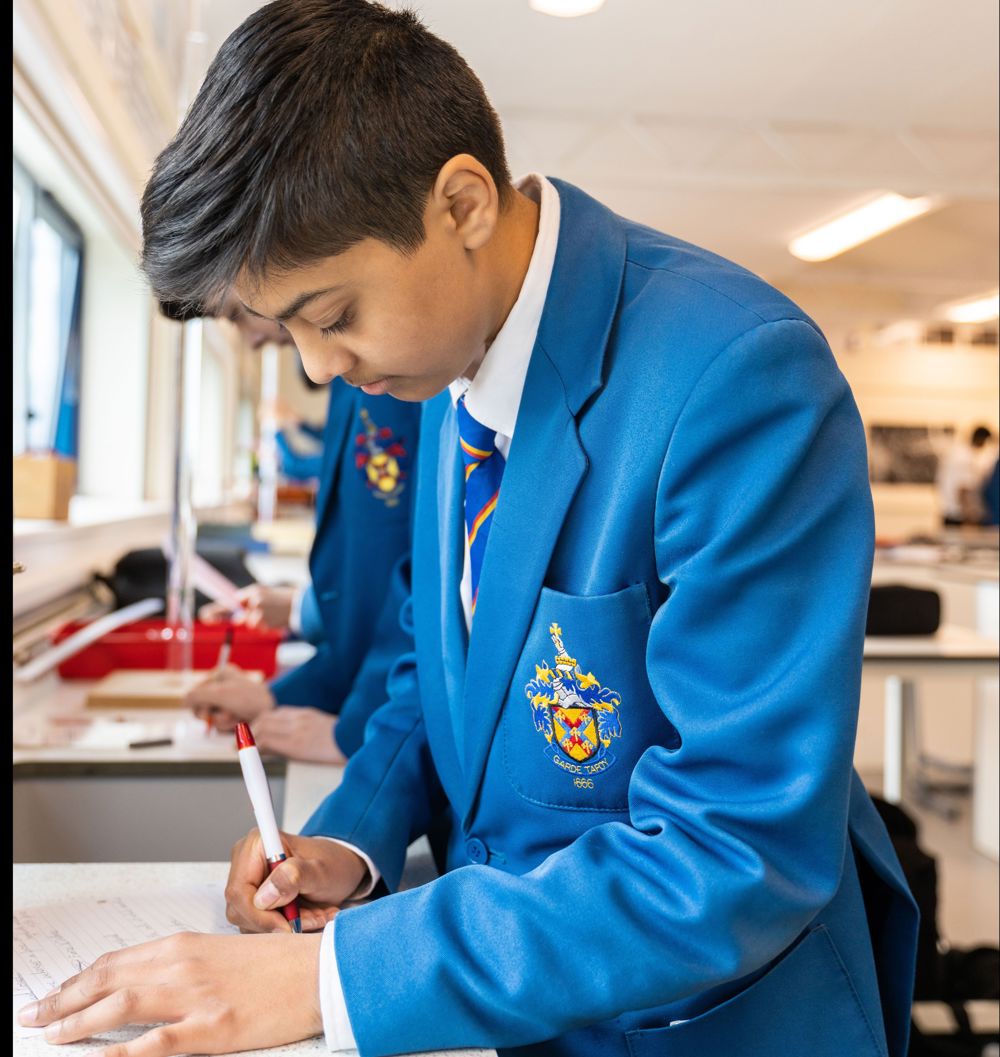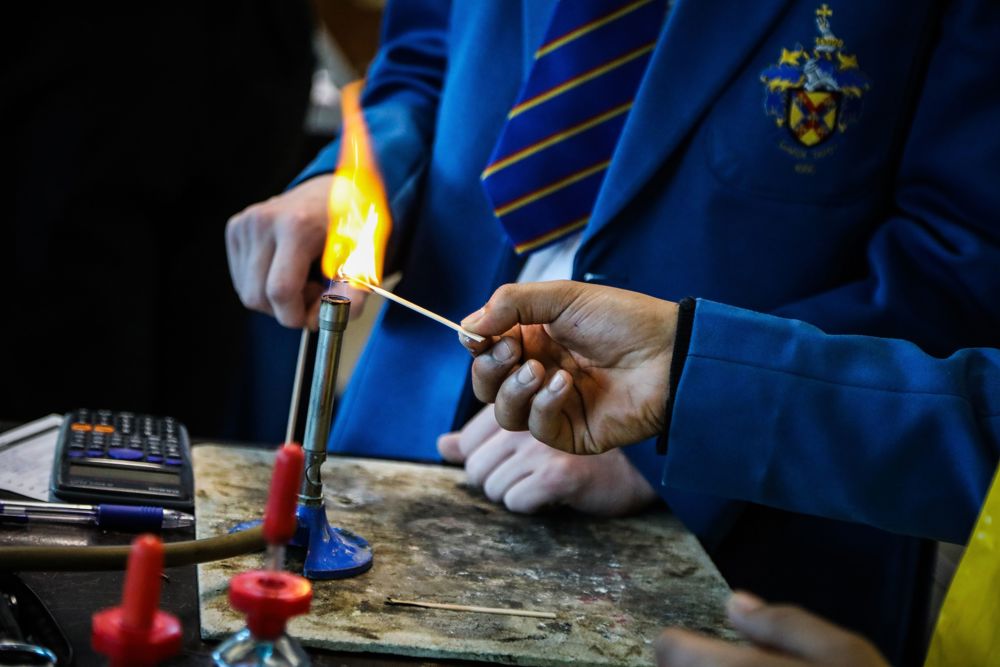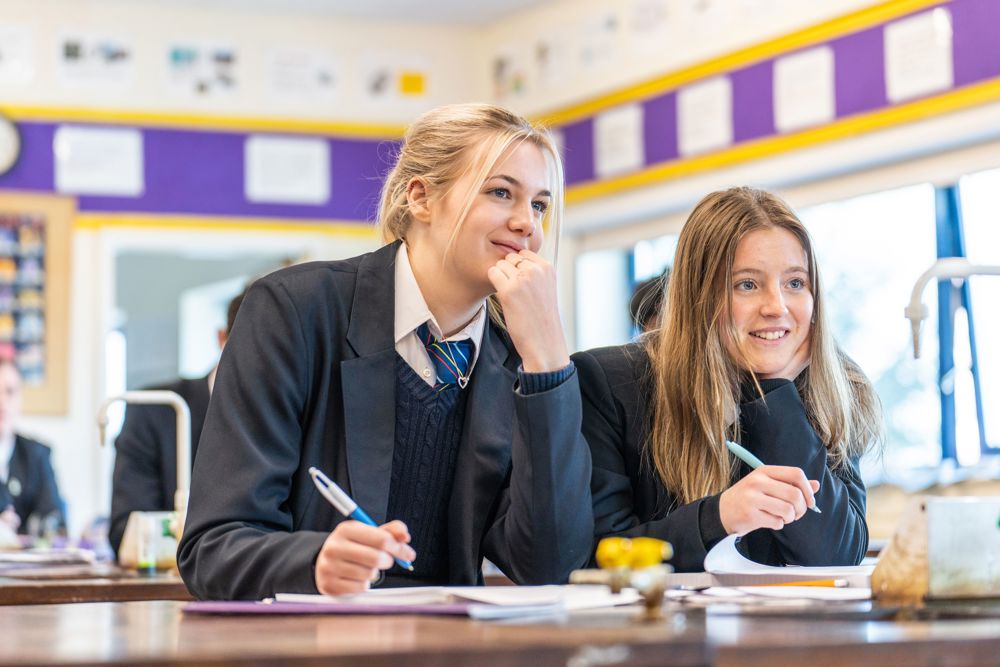
Chemistry
Chemistry is one of the most popular subjects at Sir Thomas Rich’s, and the School has a long record of excellent results in the subject at both GCSE and A Level. In Chemistry lessons pupils explore the foundations of the material world, building an extended specialist vocabulary and applying mathematical knowledge to their understanding of science. Students learn to collect, present and analyse data, guided by our expert teachers, with practical lessons and lab skills introduced from the start of Year 7.
Teachers focus on developing pupils’ intellectual curiosity and challenging established orthodoxies, and topics are carefully sequenced to ensure pupils build their subject knowledge and make links between key concepts. Learners build the confidence to work scientifically and apply knowledge, and as a result start studying the AQA GCSE course in Year 9.
Curriculum Map

Key Stage 3
Year 7 and 8 pupils are taught a general Science syllabus, before studying Biology, Chemistry and Physics as separate disciplines from Year 9. Students in Year 9 follwo the AQA GCSE syllabus and are taught Chemistry for two periods a fortnight. Homework is set once a week, with tasks including experiment write ups, research tasks, questions and revision. There are regular topic tests, plus an end of year written examination.
Year 9
Atomic structure. Analysis and gases. Mixtures and diffusion. Environmental chemistry.

Key Stage 4
Pupils follow the AQA GCSE Chemistry syllabus and are taught Chemistry for four periods a fortnight in Year 10 and five periods a fortnight in Year 11. Homework includes topic questions, writing up practicals, researching a topic, designing practical experiments and completing past papers. At the end of Year 11 two papers of 1 hour and 45 minutes each are taken. Each paper assesses five topics and comprises multiple choice, structured, closed short answer and open response questions. Eight key practical tests are undertaken (non-assessed).
Year 10
The Periodic Table. Structure and bonding. Rates of reaction. Acid, bases and salts. Organic chemistry.
Year 11
Quantitative chemistry. Energy. Equilibrium. Electrolysis. Redox.
Useful Links

Key Stage 5
Students follow the OCR Chemistry A Level syllabus and are taught for 10 periods a fortnight in both Year 12 and 13. Homework is set every week and students are expected to extend their learning by reading around the subject out of lesson time, and by completing extra practise in areas they may find particularly challenging. Students write reports on the Practical Activity Groups (PAGs) they have completed, recording the skills they are accumulating in a laboratory book, as per a chemistry-based university course. Pupils achieve a pass/fail in practical skills as well as an A Level grade. The practical skills achieved throughout the course are assessed within the written examinations. At the end of Year 13 students take three papers, comprising multiple choice, structured questions and extended response questions. Paper 1: Periodic Table, Elements and Physical Chemistry, a 2 hour 15 minute exam worth 100 marks assessing Modules 1, 2, 3 and 5. Paper 2: Synthesis and Analytical Techniques, a 2 hour 15 minute exam worth 100 marks assessing Modules 1, 2, 4 and 6. Paper 3: Unified Chemistry, a 1 hour 30 minute exam worth 70 marks, assessing Modules 1-6.
Year 12
Module 1: Development of Practical Skills. Module 2: Foundations in Chemistry – atoms, compounds, molecules and equations; amount of substance; acid-base and redox reactions; electrons, bonding and structure. Module 3: Periodic Table and Energy – Periodic Table and periodicity; Group 2 and halogens; qualitative analysis; enthalpy changes; reaction rates and equilibrium (qualitative). Module 4: Core Organic Chemistry – basic concepts, hydrocarbons; alcohols and haloalkanes; organic synthesis; analytical techniques (IR and MS).
Year 13
Module 5: Physical Chemistry and Transition Elements – reaction rates and equilibrium (quantitative); pH and buffers; enthalpy, entropy and free energy; redox and electrode potentials; transition elements. Module 6: Organic Chemistry and Analysis – aromatic compounds; carbonyl compounds; carboxylic acids and derivatives; nitrogen compounds (amines, amino acids and amides); polymers; organic synthesis; chromatography and NMR.
Entry requirement
Grade 8 GCSE Chemistry or 8-8 Double Award Science and 7 in Mathematics.
Useful Links
Enrichment
Students take part in two theory and lab-based competitions run by the Royal Society of Chemistry: Top of the Bench for selected Year 9, 10 and 11 pupils, and the Royal Society of Chemistry Analytical Chemistry Competition for selected Year 12 pupils. Our Year 12 students are all given the opportunity to participate in the Chemistry Cambridge Challenge, and Year 13 can take part in the Chemistry Olympiad.
Head of Chemistry
Katie Wilks kw@strs.org.uk